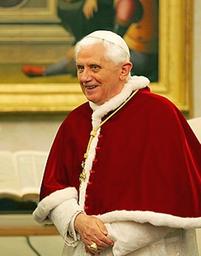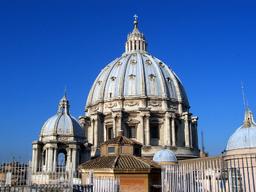Dominus Iesus (English: The Lord Jesus) is a declaration by the Congregation for the Doctrine of the Faith (known as the "Holy Office"), approved in a Plenary meeting of the Congregation and signed by its then Prefect, Joseph Cardinal Ratzinger, later Pope Benedict XVI, and of its then Secretary, Archbishop Tarcisio Cardinal Bertone, later Cardinal Secretary of State. The declaration was approved by Pope John Paul II and was published on August 6, 2000. It is subtitled "On the Unicity and Salvific Universality of Jesus Christ and the Church". It is most widely known for its elaboration of the Catholic dogma that the Catholic Church is the sole true Church of Christ.
Role of other religious communities
A Catholic dogma, Extra Ecclesiam Nulla Salus (literally "no salvation outside the Church") has sometimes been interpreted as denying salvation to non-Catholic Christians as well as non-Christians, though Catholic teaching has long stressed the possibility of salvation for persons invincibly ignorant (through no fault of their own) of the Catholic Church's necessity and thus not culpable for lacking communion with the Church. In the 20th century this inclusive approach was expressed in the condemnation of Feeneyism and in the declaration of the Second Vatican Council, which said that "the plan of salvation also includes those who acknowledge the Creator," although this is ambiguous and numerous interpretations have arisen. Vatican II further affirmed that salvation could be available to people who had not even heard of Christ (cf. Acts 17:23)— but that all who gain salvation do so only by membership in the Catholic Church, whether that membership is ordinary (explicit) or by extraordinary means (implicit).While affirming the teaching of Lumen gentium ("Light of the Nations", the 1964 Dogmatic Constitution on the Church that came out of the Second Vatican Council) that the Catholic Church "is the single Church of Christ" and that "[t]his Church, constituted and organized as a society in the present world, subsists in the Catholic Church," Dominus Iesus offers further comments on what it means for the true Church to "subsist in" the Catholic Church. The document states that, "[w]ith the expression subsistit in, the Second Vatican Council sought to harmonize two doctrinal statements: on the one hand, that the Church of Christ, despite the divisions which exist among Christians, continues to exist fully only in the Catholic Church, and on the other hand, that 'outside of her structure, many elements can be found of sanctification and truth.'"
Non-Catholic Christians
The document reserves the word "Church" for bodies that have preserved a "valid episcopate and the genuine and integral substance of the Eucharistic mystery." Such bodies, which include the Eastern Orthodox, Oriental Orthodox and the Old Catholic Churches, "are true particular Churches," and the document affirms that "the Church of Christ is present and operative also in these Churches, even though they lack full communion with the Catholic Church, since they do not accept the Catholic doctrine of Primacy."The document uses the term "ecclesial community" (from the Greek word ecclesia, meaning "church") rather than "Church" for those Christian bodies not named in the preceding paragraph, most notably including all Protestants. The document states that, although such Christian communities "are not Churches in the proper sense; however, those who are baptized in these communities are, by Baptism, incorporated in Christ and thus are in a certain communion, albeit imperfect, with the Church." It further states that such Christian communities, "though we believe they suffer from defects, have by no means been deprived of significance and importance in the mystery of salvation. For the spirit of Christ has not refrained from using them as means of salvation."
Non-Christian religions
The document declares that, although the Christian church is intended by God to be "the instrument for the salvation of all humanity," such beliefs do not "lessen the sincere respect which the Church has for the religions of the world." It does, however, "rule out, in a radical way... a religious relativism which leads to the belief that ‘one religion is as good as another'"The document goes on to affirm the possibility that those who subscribe to non-Christian religions may be saved while insisting that the means of such salvation must be Christ, and not the religion to which such a person subscribes: "If it is true that the followers of other religions can receive divine grace, it is also certain that objectively speaking they are in a gravely deficient situation in comparison with those who, in the Church, have the fullness of the means of salvation." The document then immediately reminds Christians that their more direct enjoyment of the means of salvation comes "not from their own merits, but from the grace of Christ. If they fail to respond in thought, word, and deed to that grace, not only shall they not be saved, but they shall be more severely judged."
Assessments
Criticism of the document focused on passages such as the one stating that Protestant bodies "are not Churches in the proper sense" and "suffer from defects" and the one stating that non-Christian religions are "gravely deficient," while paying less attention to the accompanying positive statements about both groups. Some critics questioned the Church's commitment to ecumenism.In response to these criticisms, Pope John Paul II – who had personally endorsed, ratified, and confirmed Dominus Iesus – emphasized on October 2 of that year that this document did not say that non-Christians were denied salvation: "This confession does not deny salvation to non-Christians, but points to its ultimate source in Christ, in whom man and God are united."
John Paul II then issued on December 6 a statement to emphasize further that the Church continued in the position of Vatican II that salvation was available to believers of other faiths:
"Those who have chosen the way of the Gospel Beatitudes and live as "the poor in spirit", detached from material goods, in order to raise up the lowly of the earth from the dust of their humiliation, will enter the kingdom of God."
He further added, "All the just of the earth, including those who do not know Christ and his Church, who, under the influence of grace, seek God with a sincere heart (cf. Lumen gentium, n. 16), are thus called to build the kingdom of God by working with the Lord, who is its first and decisive builder."
Eastern Orthodox response
"'But the point of the passage is that all faith communities that baptize in the name of the Father, Son and Holy Spirit bring salvation', said the Rev. John G. Panagiotou, chancellor of the Greek Orthodox Diocese of Pittsburgh, who has degrees in both Catholic and Orthodox theology. 'It affirms that grace is present in all of these confessing communities. It does talk about a uniqueness in the Catholic tradition...but it doesn't say anything derogatory,' Panagiotou said. 'I think the media has taken a big spin on this and made it a polemic instead of explaining what the document really says.'"


